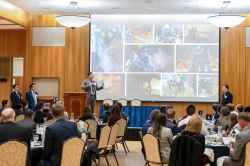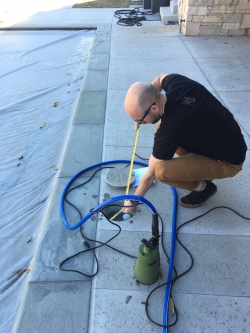Creating a World of Innovative Thinkers
PROVO, Utah – Aug 18, 2020 – Socks that monitor a baby’s heart rate, home security cameras that alert homeowners via text messages, and doors that use an app to open for those who need assistance have more in common than one might think. They’re all projects that BYU students have tackled in the Crocker Innovation Fellowship program. The program, a joint effort between the BYU Marriott School of Business and other colleges across BYU campus, combines the strengths of students in business, engineering, computer science, and other programs to identify problems and to innovate solutions.
These opportunities within the program have been made possible through the generous support of Gary and Ann Crocker. Gary Crocker, a biotech innovator and a Utah native, is passionate about supporting breakthroughs in science and entrepreneurship in the state. “Gary Crocker's generous funding allows us to give the students money that they need to build prototypes, validate their ideas, run experiments, and go to trade shows,” says Nile Hatch, a BYU Marriott associate professor of entrepreneurship.
Rather than teaching innovation through more traditional methods, Hatch and the other professors involved with the program teach innovation through a unique interactive experience. Students apply to be accepted in the limited-enrollment Crocker Innovation Fellows class which runs from January of one year to January of the next year. From the first day of the class, they tackle a variety of challenges to learn the skills associated with innovation. “We start the class with a boot camp. On the first day of class, we don’t give students a syllabus,” Hatch says. “We tell the students to build a working prototype to solve a problem in three weeks.”
After creating their three-week projects, the students identify new problems, brainstorm solutions, and create another innovation throughout rest of the duration of the program. “Once students narrow in on a problem to solve, we sit together and do a brain writing (brainstorming) exercise to gather as many ideas for solutions as we possibly can,” says Hatch. “As faculty, we teach the students methods to help them screen those ideas and throw out those that are unlikely to work, helping to narrow down their lists to three ideas that they're going to focus on.” Students test and prototype these new ideas until they choose one to perfect as a final product.
Eventually, students present these finished products at trade shows. “As faculty members, we learned from experience that if students go to trade shows and present their innovation as sellers, the shows provide a massive learning experience,” says Hatch. For the first time in the program’s history, students this year attended the Consumer Electronics Show in January to observe and analyze the presentations they saw there.
As students design their innovations, they collaborate on interdisciplinary teams. “A startup team built exclusively out of entrepreneurship students is not a well-rounded team,” says Hatch. “We need technical experience, and we need different backgrounds from people all over campus.” Entrepreneurship students might be placed in groups with students who study engineering, industrial design, or computer science.
As students work in these cross-discipline collaborative teams, professors from departments across campus create educational opportunities for these teams to succeed. “Professors in the program teach subjects such as business, design, law, engineering, and information technology,” says Hatch. “As faculty members, we regularly say to each other, ‘I learned something today. You taught me something.’”
With a foundation of teamwork and innovation principles, past teams have gone on to find commercial success with their Crocker program innovations, building companies such as Owlet, Novi, and Portal. Owlet created a smart sock baby monitor that tracks heart rate and oxygen levels as a baby sleeps. Novi, a home security company, manufactures devices that send pictures to owners’ smartphones when motion sensors are triggered, and Portal uses a smartphone app to make doors more wheelchair accessible.
Beyond any commercial success they might achieve, students who pass through the program learn lifelong lessons. “The program’s real goal is to populate the world with people who have core principles of innovation that they've practiced,” says Hatch. As graduates who have completed the Crocker Fellowship program begin their professional careers, Hatch believes they are prepared to be the type of innovators who can make a difference in the world. “Those principles make them a better innovator at work, in their homes, and in their personal lives.”
Media Contact: Chad Little (801) 422-1512
Writer: Kenna Pierce





